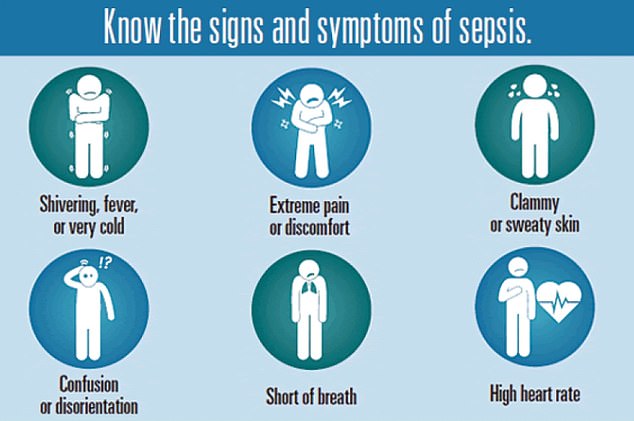According to one study, half of patients admitted to hospital with sepsis die within two years.
This life-threatening condition can occur when the body’s immune system, which usually helps fight infections, overreacts to an infection and attacks its own organs.
According to the World Health Organization (WHO), sepsis kills 11 million people worldwide each year, while in the UK it kills around 48,000 a year.
Danish researchers investigated factors that could predict the outcomes of 714 patients admitted to an emergency medical department with sepsis.
The researchers found that the risk of death increased if the patient had heart disease, cancer, dementia or had previously been hospitalized with sepsis in the past six months.
Danish researchers investigated factors that could predict the outcomes of 714 patients admitted to an emergency medical department with sepsis and found that 50 percent die within an average of two years.

This life-threatening condition can occur when the body’s immune system, which usually helps fight infections, overreacts to an infection and causes organ damage.
In a 2020 report, the WHO highlighted limitations and gaps in knowledge about sepsis outcomes and called for prospective studies to investigate the long-term outcomes of sepsis patients.
Dr. Finn Nielsen, senior scientist at the Department of Clinical Epidemiology at Aarhus University Hospital, Denmark, established the sepsis research group in its emergency department in 2017.
The study examined the outcomes of patients admitted with sepsis between October 2017 and the end of March 2018 using data on deaths from Danish registration systems, which provide up-to-date information on all Danish citizens.
A total of 2,110 patients with suspected infection were included in the study, and 714 of them developed sepsis.
The researchers found that after an average of two years, 361 (50.6 percent) of the sepsis patients had died from any cause, including sepsis.
Unsurprisingly, they also found that advancing age increased the risk of death by 4 percent for each additional year of age.
Additionally, a history of cancer more than doubled the risk (121 percent), while ischemic heart disease (a condition in which the arteries supplying blood to the heart become narrowed or blocked by a buildup of fat) increased the risk by 39 percent. percent.
Additionally, dementia increased the risk by 90 percent, and prior admission with sepsis in the past six months increased the risk by 48 percent.
Dr. Nielsen, a specialist in emergency medicine, cardiology and internal medicine, said: “Our study was based on a sepsis database, which provided valuable information based on prospectively collected patient data. Unlike registry data routine tests used frequently, this approach minimized errors and allowed for more accurate and detailed information on the effects of sepsis.
However, as the study was conducted at a single center in Denmark, more research is needed in larger prospective studies.
Speaking at the European Congress of Emergency Medicine, Dr Nielsen said: “We have sought to address some of the gaps in our understanding of the epidemiology of sepsis.
‘We have contributed research that, unlike many other studies, is based on prospective research based on electronic medical records.
“Similar but larger studies on sepsis-related outcomes need to be repeated in all departments, regions and countries to obtain a complete epidemiological picture of sepsis, including long-term prognostic aspects of physical, mental and cognitive disorders, and the potential impact of these factors on the risk of death.’
Dr. Nielsen and his colleagues tried to develop a model that could predict the long-term risk of death, but found that its predictive power was not good enough.
Dr. Barbra Backus is chair of the European Society of Emergency Medicine (EUSEM) abstract selection committee and an emergency physician in Rotterdam, the Netherlands, and was not involved in the research.
She said: ‘Sepsis is a serious and potentially fatal medical condition. The incidence of sepsis is increasing in several countries; However, until now there has been limited, reliable information on the long-term outcomes of patients who develop sepsis.
‘This study has shown certain risk factors that should alert doctors to the risk of sepsis patients having a higher risk of dying, so that they can monitor and follow them more closely.
“More research is needed to help us better understand the risk factors for an increased risk of dying from sepsis, which may help improve treatment.”


